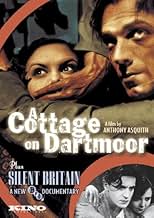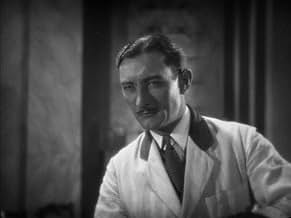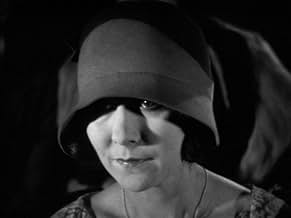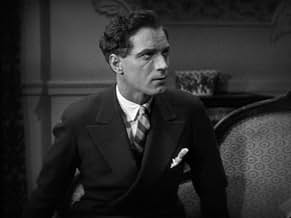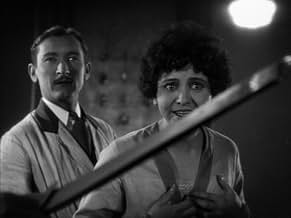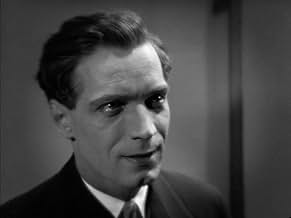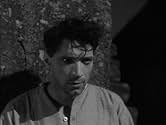AVALIAÇÃO DA IMDb
7,5/10
1,3 mil
SUA AVALIAÇÃO
Adicionar um enredo no seu idiomaA former barber escapes from a high security prison. Flashback story of an escape from the lonely, high-security Dartmoor Prison.A former barber escapes from a high security prison. Flashback story of an escape from the lonely, high-security Dartmoor Prison.A former barber escapes from a high security prison. Flashback story of an escape from the lonely, high-security Dartmoor Prison.
- Direção
- Roteiristas
- Artistas
Hans Adalbert Schlettow
- Harry - a Dartmoor Farmer
- (as Hans Schlettow)
Anthony Asquith
- Bespectacled Man in Cinema
- (não creditado)
Judd Green
- Customer
- (não creditado)
- Direção
- Roteiristas
- Elenco e equipe completos
- Produção, bilheteria e muito mais no IMDbPro
Avaliações em destaque
Stylish and tense melodrama which features an opening scene where a man who has just escaped from prison is seen crossing the stark and gloomy moors, the sky darkened by black clouds, and not much more to be seen than a few wandering cows and a dark, bare tree. A woman cares for her baby at a lonely, isolated cottage, the man slithers in and confronts her and - she knows him! Now in flashback we see the background story of these two, Joe and Sally, co-workers in a barber shop where he gives men a shave and a haircut while she manicures their nails and gives the customers flirtatious smiles. This prompts more than just jealousy in this man - he pursues her, she doesn't really seem to like him that much but does agree to go out with him and they spend an evening together at her boarding-house where numerous well-meaning, slightly interfering old-timers seem to live (and he gets some pretty scary expressions on his face in what seems to be his desperation to kiss her). When she agrees to go see a "talkie" with a certain male customer, Joe turns stalker as he sneaks into the theater, secretly plants himself in the row behind them, and in an amazingly photographed scene shot using rapid-paced editing, we never see the film they are watching - instead the camera cuts between audience members plus Sally reacting as they watch the film, the orchestra playing, and Joe - who is not watching the film at all, but rather he's glaring in a steady gaze at Sally and her "date" in front of him.
This is a really excellent, well done film featuring loads of interesting cinematography - softly filtered lighting and shadowy scenes, facial close-ups, and lots of fast cutting. The guard who discovers Joe's escape is seen mainly in shadows against the cell walls, the menacing face of the convict as the camera quickly zooms in to show his face as the woman recognizes him, Joe sharpening his razor, quickly cut between two gossiping female co-workers, as he contemplates murder! The Kino DVD of this features a great looking black and white print and nicely done piano score that helps enhance the tension in the film. A great silent film, well worth seeing.
This is a really excellent, well done film featuring loads of interesting cinematography - softly filtered lighting and shadowy scenes, facial close-ups, and lots of fast cutting. The guard who discovers Joe's escape is seen mainly in shadows against the cell walls, the menacing face of the convict as the camera quickly zooms in to show his face as the woman recognizes him, Joe sharpening his razor, quickly cut between two gossiping female co-workers, as he contemplates murder! The Kino DVD of this features a great looking black and white print and nicely done piano score that helps enhance the tension in the film. A great silent film, well worth seeing.
10sunlily
A Cottage on Dartmoor is a late British silent of stunning clarity and poetic justice. The use of the camera to caress the homey accents in Norah's boarding house, the use of mirrors to dramatize the lives and thoughts of the characters, the elongated camera angles of the escaped convict jumping from captivity to freedom, and running from his past into redemption. All of this and more make this late silent itself almost a valentine to the end of the silent era and the dawn of sound.
One of the most poignant scenes in the movie demonstrates this by taking us to a "talkie" that nonetheless has a full orchestra that the camera hones in on and romanticizes.
While this is a tale of obsession, it is also a story of love that has many emotionally tense elements that Norah Baring and Uno Henning handle with dignity and grace. I'm very surprised that I've not heard more about either of these actors.
A Cottage on Dartmoor is a very beautifully realized film that probably wouldn't have been as effective had it been made as a sound movie.
One of the most poignant scenes in the movie demonstrates this by taking us to a "talkie" that nonetheless has a full orchestra that the camera hones in on and romanticizes.
While this is a tale of obsession, it is also a story of love that has many emotionally tense elements that Norah Baring and Uno Henning handle with dignity and grace. I'm very surprised that I've not heard more about either of these actors.
A Cottage on Dartmoor is a very beautifully realized film that probably wouldn't have been as effective had it been made as a sound movie.
From time to time, it is very laudable for this German count to re-watch some of those silent films of his aristocratic youth. Overall, this in order to check if the passage of time has positively or negatively influenced his recollection of the remarkable aspects of such films. That's not to mention that fortunately many of those films after such long time are now cleaned and restored -- nothing in common with those rotten and blurred nitrates that are stored at this Herr Graf's gloomy cellar that necessarily need an extra pair of monocles each time that they are shown at the Schloss theatre.
This time such advisable aristocratic and nostalgic film habits had excellent artistic results. That's because after 70 years from its official release, "A Cottage On Dartmoor", a film directed by Herr Anthony Asquith, preserves intact its many and excellent virtues. The perfect word that summarizes the merits of that British film: virtuosity.
Herr Anthony Asquith skillful film direction begins as the films starts. It introduces a convict that escaped from prison running away along Dartmoor meadows. With the sole purpose of revenge, he tries to find the girl that causes him imprisonment; when finally he finds her, a fascinating flashback starts.
A superb display of film technique can be seen in the film. There are such as perfect images ( Expressionism influences are obvious in the film, in its obscure and visual conception ) concatenations or fascinating visual metaphors ( the use of the camera is astounding: remarkable and imaginative camera angles that scrutinizes the tormented soul and evil intentions of the main character of the film ). It depicts an intriguing, thrilling and original story. A barber, Joe ( Herr Uno Henning ) falls in love with a manicurist, Sally ( Dame Norah Baring ) in the same place where both work. Joe is rejected by her and doesn't accept that ultimately Sally loves a client, Harry ( Herr Hans Adalbert Schlettow ). Consumed by jealousy, tries to murder Harry.
It has a perfect "tempo" in order to explain and show such a tormented love story that will finish with a poetic, sorrowful ending. Only one thing is lacking in seeing the film and is Dame Norah Baring's performance. Probably she is so stiff, inexpressive and frigid due to the abuse of the use of tea -- that awful beverage that usually is drunk by commoners and even eccentric aristocrats in the perfidious Albion. But that's a minor flaw that doesn't damage excessively the excellent artistic merits of such remarkable film.
And now, if you'll allow me, I must temporarily take my leave because this German Count must go to a decadent soirée pretty well-combed.
Herr Graf Ferdinand Von Galitzien http://ferdinandvongalitzien.blogspot.com/
This time such advisable aristocratic and nostalgic film habits had excellent artistic results. That's because after 70 years from its official release, "A Cottage On Dartmoor", a film directed by Herr Anthony Asquith, preserves intact its many and excellent virtues. The perfect word that summarizes the merits of that British film: virtuosity.
Herr Anthony Asquith skillful film direction begins as the films starts. It introduces a convict that escaped from prison running away along Dartmoor meadows. With the sole purpose of revenge, he tries to find the girl that causes him imprisonment; when finally he finds her, a fascinating flashback starts.
A superb display of film technique can be seen in the film. There are such as perfect images ( Expressionism influences are obvious in the film, in its obscure and visual conception ) concatenations or fascinating visual metaphors ( the use of the camera is astounding: remarkable and imaginative camera angles that scrutinizes the tormented soul and evil intentions of the main character of the film ). It depicts an intriguing, thrilling and original story. A barber, Joe ( Herr Uno Henning ) falls in love with a manicurist, Sally ( Dame Norah Baring ) in the same place where both work. Joe is rejected by her and doesn't accept that ultimately Sally loves a client, Harry ( Herr Hans Adalbert Schlettow ). Consumed by jealousy, tries to murder Harry.
It has a perfect "tempo" in order to explain and show such a tormented love story that will finish with a poetic, sorrowful ending. Only one thing is lacking in seeing the film and is Dame Norah Baring's performance. Probably she is so stiff, inexpressive and frigid due to the abuse of the use of tea -- that awful beverage that usually is drunk by commoners and even eccentric aristocrats in the perfidious Albion. But that's a minor flaw that doesn't damage excessively the excellent artistic merits of such remarkable film.
And now, if you'll allow me, I must temporarily take my leave because this German Count must go to a decadent soirée pretty well-combed.
Herr Graf Ferdinand Von Galitzien http://ferdinandvongalitzien.blogspot.com/
Uno Henning escapes from Dartmoor Prison and makes it to a small cottage where he confronts Norah Baring. We see in flashback that he worked in a barber shop and had a crush on Baring. After she (kind of) unintentionally leads him on, he discovers that she plans on marrying customer Hans Adalbert Schlettow. Bad things happen.
The last of four silent films made by Anthony Asquith, it was made so much on the cusp of talking films that the characters go see one in the film. It's a striking visual film with strong expressionist elements and odd, dynamic editing. It's also about 15 minutes too long.
Asquith cameos as a customer in the quite long movie theater scene.
The last of four silent films made by Anthony Asquith, it was made so much on the cusp of talking films that the characters go see one in the film. It's a striking visual film with strong expressionist elements and odd, dynamic editing. It's also about 15 minutes too long.
Asquith cameos as a customer in the quite long movie theater scene.
Firstly, let me say that my little lad eats the occasional rusk and loved them when a baby (now nearly 4). I loved this movie...I saw it for the first time last night on the BBC. I too enjoyed the flashback vehicle, which by using the exclamation (via title) "Joe!" jolted us into flashback. I thought the use of mirrors imaginative and symbolic (Norah appearing at times a disembodied - if beautiful - head among possessive men in the barbershop. I was quite enthralled by the big farmer coming in for a manicure (wink-wink). The images are on reflection quite disturbing in the barbershop...a man having his hands caressed by a pretty girl whilst a cut throat razor is applied to his throat. I too found the trip to the cinema memorable and also poignant. The director at pains to reveal to us the value of the cinema orchestra at a time when their jobs would have been in extreme peril. Couple this with mention of a "talkie" earlier (this received a blank response) and these elements could be viewed as a swan song for the silents. You must see this film, it is truly wonderful. The performances are spot on and it does not always take the predictable turn. Considering the intensity of obsession the male lead character conveys, the film develops great warmth. UNIQUE!!
Você sabia?
- Erros de gravaçãoJoe's coworker reaches down to pick up the movie tickets with his right hand, but the close-up shows his left hand grabbing them.
- ConexõesFeatured in Cinema Europe: The Other Hollywood (1995)
Principais escolhas
Faça login para avaliar e ver a lista de recomendações personalizadas
Detalhes
- Tempo de duração1 hora 28 minutos
- Cor
- Mixagem de som
- Proporção
- 1.20 : 1
Contribua para esta página
Sugerir uma alteração ou adicionar conteúdo ausente

Principal brecha
By what name was Uma Casa em Dartmoor (1930) officially released in Canada in English?
Responda
